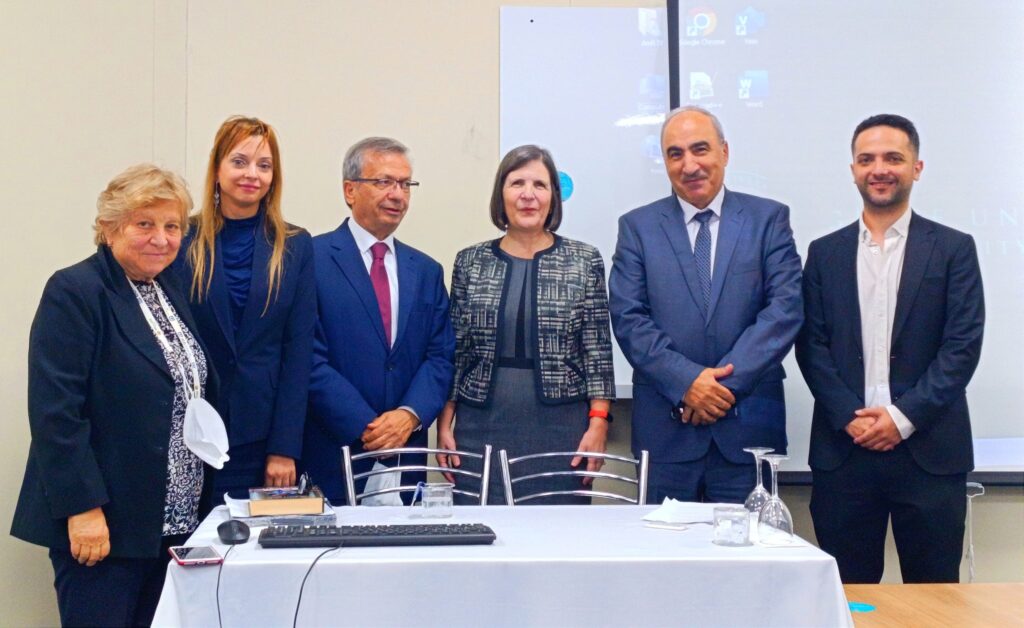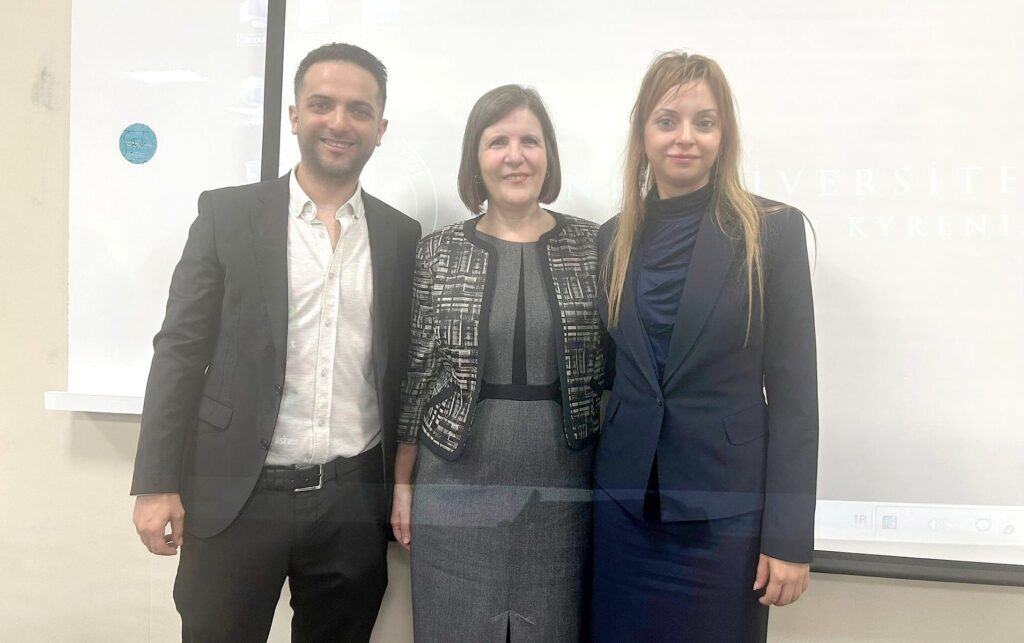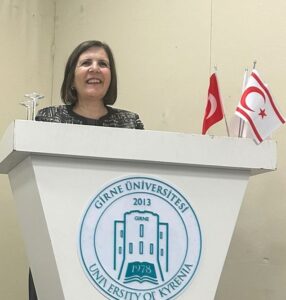
“International Relations and Diplomacy Centre” established at University of Kyrenia was opened. The opening seminar of the centre was held by Dr. Sibel Siber, former Speaker of the Parliament and at the same time the first female Prime Minister of TRNC. In the seminar, which was held with intense participation; Dr Sibel Siber made important evaluations on the ethnic tensions, the struggle for political equality and the solution process, starting from the origins of the Turkish presence in Cyprus to the present day.
University of Kyrenia International Relations and Diplomacy Centre aims to conduct comprehensive research, develop policy recommendations and provide advanced training to students in areas such as international security, diplomacy, conflict management, economic development and environmental sustainability. The Centre aims to contribute to diplomatic studies at regional and global level and to be an important reference point in the academic field.

Assoc. Prof. Didem Aydındağ: “We aim to enrich our perspectives and increase the impact of our research by creating an environment based on diversity, inclusion and sustainability.”
“We aim to enrich our perspectives and increase the impact of our research by creating an environment based on diversity, inclusiveness and sustainability,” said Assoc. Prof. Didem Aydındağ, Director of the University of Kyrenia International Relations and Diplomacy Centre. “We will focus on key areas such as international security, global governance, sustainable development and the impact of technology on international relations. I firmly believe that a more peaceful world can be built through our work in these areas.”

Giving the first seminar of the inaugurated University of Kyrenia International Relations and Diplomacy Centre, Dr. Sibel Siber, former Speaker of the Parliament and the first female Prime Minister of the TRNC, discussed the relations of the communities living on the island since the Ottoman Empire conquered Cyprus and the effects of the British Colonial rule. Dr Sibel Siber also explained the negotiation processes of the Turkish and Greek Cypriots since the mid-20th century and the diplomatic developments with the participation of Britain, Greece and Turkey.
Prof. Dr. Siber stated that during the process of the Ottoman Empire’s departure from the island, Turkish Cypriots were leaderless and unorganised, while Greek Cypriots were highly organised with their churches and clubs. However, he said that over time, with the distrust of the colonial administration and the disbelief that the Ottomans would take back the island from the British, Turkish Cypriots also started to organise. Stating that this organisation started in clubs, Dr. Sibel Siber emphasised that the Kardeş Ocağı, which was established in 1909, is an important historical institution as the first civil society organisation of Turkish Cypriots. She explained that the Kardeş Ocağı undertook very important missions especially during the years of colonial rule and worked almost like a parliament.
Prof. Dr. Siber underlined that the recognition of the right to self-determination by the United Nations in 1945 after the Second World War strengthened the idea of Enosis among Greek Cypriots. He explained that the Enosis Plebiscite was held in 1950 under the leadership of the Church and 96 per cent of the votes were approved. He stressed that on 16 August 1954, Greece brought the issue to the UN for the recognition of the right to self-determination for Greek Cypriots, thus the Cyprus issue came to the UN for the first time. On 5 December 1968, he mentioned that the first resolution on Cyprus was adopted at the UN.
Summarising the history of negotiations in Cyprus, Dr. Siber talked about the negotiation processes until the London and Zurich Agreements signed by Dr. Fazıl Küçük, the leader of the Turkish Cypriots, and the negotiation processes after the dissolution of the Republic. With the 1955 London Conference, Greece, Britain and Turkey discussed the Cyprus issue at the same table for the first time and Dr. Sibel Siber evaluated the proposals made by Britain to Greek Cypriot leader Makarios to amend the Constitution, and emphasised that Taksim was brought to the agenda with the 1958 Mcmillan Plan, but all these proposals were rejected by the Greek Cypriot side. Explaining that negotiations continued at intervals after the dissolution of the Republic of Cyprus, Siber also mentioned the 1964 American Achesson Plan.
In his speech, Prof. Dr. Siber explained that the negotiations that started in Beirut in 1968 between Kleridis and Denktaş continued until June 1974. He said that all of these negotiations were discussed and closed in the secret sessions of the Community Assembly and that he opened them for the first time during his Presidency of the Assembly, almost half a century later, with the decision of the council. He emphasised that these negotiation minutes are important documents that shed light on our history. Stating that the Greek Cypriot leaders’ rejection of the political equality of Turkish Cypriots in the negotiations made the solution process difficult, Dr. Siber emphasised the importance of the two communities seeing each other as equal partners for lasting peace. Explaining that political equality, which is the basic parameter of the federation, was rejected with the Greek Cypriot leader’s statement that “20 percent cannot rule 80 percent” in the Cyprus negotiations, Dr. Siber said that it is possible to reach a solution where mutual rights are respected and both communities will feel safe. Dr Sibel Siber said, “Leaders make the solution, peoples make the peace. The solution is on the table but peace is in the hearts”.